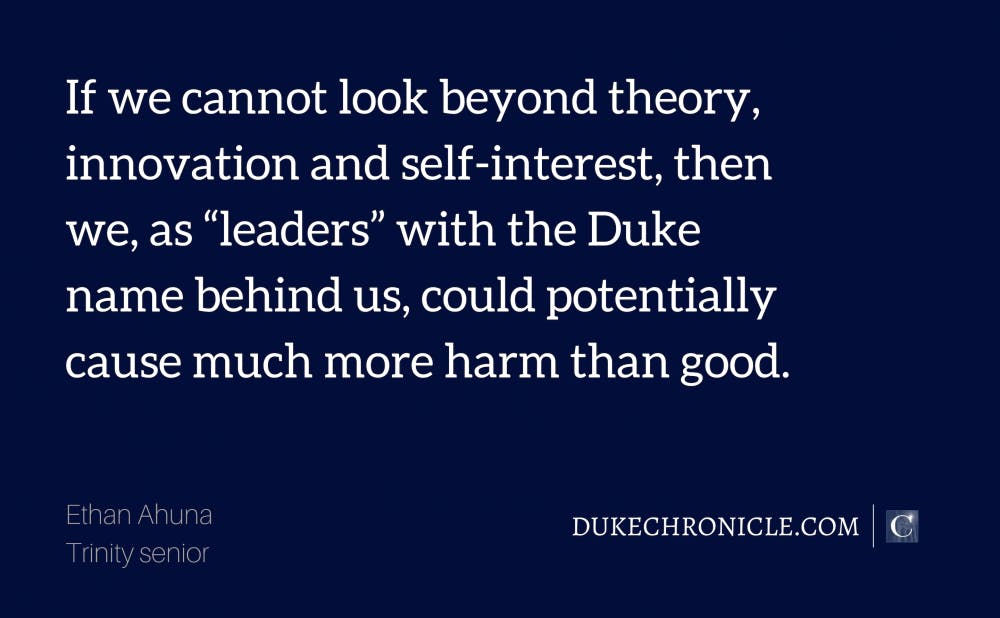In one of my classes this semester, my professor handed us an advertisement and told us to “problematize” it—to point out any ethical flaws we might notice. The ad featured a white college student hugging two young black children, with a caption about “future leaders” and “a more just world.” A group of my classmates and I pointed out some of the problematic elements of the ad: the power dynamics of the white student and the black children, the implications of the words “leaders” and “just,” and the general notions of white saviorism, voluntourism and privilege that the ad reinforced.
As we were talking, one of the upperclassmen in the group casually mentioned that before taking the class, they never would have thought the ad was problematic. At first, I was shocked that they could make it that far into Duke without ever “problematizing” service. After all, Duke has instilled in me an awareness of issues of privilege, voluntourism and white savior complexes since I first arrived here. But then I realized the only reason I had ever been exposed to these concepts in the first place is because, on a whim, I signed up for a FOCUS cluster during my first semester where ethics of service was the centerpiece of the curriculum.
In that moment, it occurred to me how easy it can be to graduate Duke without ever needing to think critically about ethics, privilege and impact—and just how wrong that is.
In my high school, topics like ethics and empathy were never a priority. I had never questioned service trips, analyzed current events in terms of the potential consequences they could have for different people and communities, or had any meaningful discussions about privilege. Until I was forced to confront those concepts in my college coursework, I didn’t even know that I was missing out on crucial conversations. And we are fortunate that there are many academic trajectories at Duke where critically examining ethical issues—or at least forcing students to look at the human experience from perspectives of their own—are an essential building block of the curriculum. I fell into one of those trajectories by chance, and it has given me a certain critical lens that I didn’t even know I needed.
But there are also many academic tracks at Duke that largely omit engaging with the human experience. All majors at Duke are rigorous and intellectually stimulating, but some—particularly those that are more quantitative—are not so focused on human impact. For Trinity students, a meager requirement of two courses with “Ethical Inquiry” codes attached to them might be the most they are forced to engage in such conversations. While Pratt students do have a social sciences and humanities requirement, the degree requirements guidelines do not mandate any courses specifically regarding ethics or service.
And regardless of department or discipline, most of us at Duke have the privilege to live in theory. It seems to me that Duke largely teaches us to base our intellectual ideas of truth on philosophers, formulas and theoretical fact. Our understandings of right and wrong, smart and foolish, rational and irrational are based on theories, statistics and supply and demand curves. Many of us are becoming experts at gauging success in terms of profit margins, chemical reactions, mathematical solutions, statistics, the soundness of theories or the complexity and nuance of an argument. But what about everyday people who aren’t afforded the privilege of a Duke education? What about the people who cannot afford to live in theory, but are most directly impacted by the effects of us doing so?
Duke seeks to prepare us to be leaders. If we follow in the footsteps of our vast and successful alumni network, we will soon be crafting policy, treating patients, producing research, creating technology, and managing organizations in ways that could have tangible impacts on people of various cultures, demographics, and values. Regardless of what fields we pursue, Duke has positioned us to have influence. And while many of us might not work as immediately with members of marginalized populations as we might on a DukeEngage trip, that does not mean that communities will not feel the effects of our work and our choices.
So if we have not developed a sense of critical awareness as to the consequences of our decisions, and those of other people and institutions in power, our “influence” could be a negative one. If we cannot look beyond theory, innovation and self-interest, then we, as “leaders” with the Duke name behind us, could potentially cause much more harm than good.
Part of Duke’s mission statement is “to promote a deep appreciation for the range of human difference and potential, a sense of the obligations and rewards of citizenship, and a commitment to learning, freedom and truth.” While there are opportunities abound to develop such an appreciation, those opportunities are not made mandatory—at Duke, developing an appreciation for human difference and a sense of obligation toward citizenship is a self-selecting process. And if there are students graduating from Duke who have never been forced to seriously and critically look at the world from perspectives other than their own, just how “world class” can our Duke education be?
Get The Chronicle straight to your inbox
Signup for our weekly newsletter. Cancel at any time.

